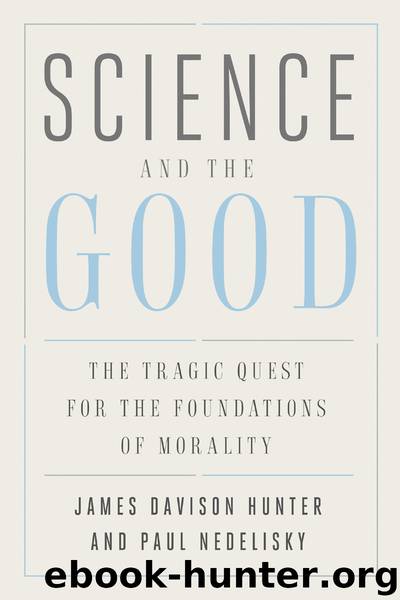Science and the Good by James Davison Hunter

Author:James Davison Hunter
Language: eng
Format: epub
Publisher: Yale University Press
AN INTERNAL BARRIER
Can one derive an “ought” from an “is”? Hume’s Law notwithstanding, some continue to try to do so.32 The question continues to intrigue and confound. But it defies any simple resolution because of the enduring challenges of definition and demonstration.
In Bentham’s “felicific calculus,” for instance, the basis for morality was found in how much pleasure resulted from an action, but it failed because it couldn’t generate agreement that pleasure and the absence of pain were the only valuable things in the moral life. Nor could the utilitarians convince their critics that valuable things formed the only basis for morality—that there were no duties or rights that could trump calculations in terms of valuable consequences.
Across four centuries, approaches to the science of morality can be positioned roughly between two points on a spectrum of possible definitions of morality. On one end are definitions that involve genuine goods—“oughts,” duties, rights, and the like—that have some real prescriptive authority over human behavior. At the other end of the spectrum are definitions that permit empirical assessment—definitions consisting of terms that can be observed or measured.
Both the historical record and the leading contemporary conceptual logics suggest that a moral theory can approach one end of this spectrum only by distancing itself from the other. If a theory of morality is understood to involve genuine value and absolute prohibitions, it will stand a better chance of being recognized as a genuine theory of morality. But defining morality in this way rules out scientific demonstration, since value, duty, rights, and the like resist empirical detection. On the other hand, scientific approaches that attempt to reimagine morality in empirical terms stray from an understanding of morality that is adequate to its lived experience, to the genuinely prescriptive character of moral life. The consequence is that scientific approaches at the empirical end of the spectrum fail to persuade people that their conclusions are really about morality. The hope of resolving moral disagreement by appealing to scientific research therefore faces an internal barrier, since moral disagreements appear not to turn on issues that admit empirical resolution.
Download
This site does not store any files on its server. We only index and link to content provided by other sites. Please contact the content providers to delete copyright contents if any and email us, we'll remove relevant links or contents immediately.
The Lost Art of Listening by Michael P. Nichols(7506)
Why I Am Not A Calvinist by Dr. Peter S. Ruckman(4153)
The Rosicrucians by Christopher McIntosh(3519)
Wicca: a guide for the solitary practitioner by Scott Cunningham(3178)
Signature in the Cell: DNA and the Evidence for Intelligent Design by Stephen C. Meyer(3138)
Real Sex by Lauren F. Winner(3023)
The Holy Spirit by Billy Graham(2952)
To Light a Sacred Flame by Silver RavenWolf(2823)
The End of Faith by Sam Harris(2742)
The Gnostic Gospels by Pagels Elaine(2531)
Waking Up by Sam Harris(2460)
Nine Parts of Desire by Geraldine Brooks(2369)
Jesus by Paul Johnson(2362)
Devil, The by Almond Philip C(2331)
The God delusion by Richard Dawkins(2309)
Heavens on Earth by Michael Shermer(2284)
Kundalini by Gopi Krishna(2184)
Chosen by God by R. C. Sproul(2164)
The Nature of Consciousness by Rupert Spira(2108)
